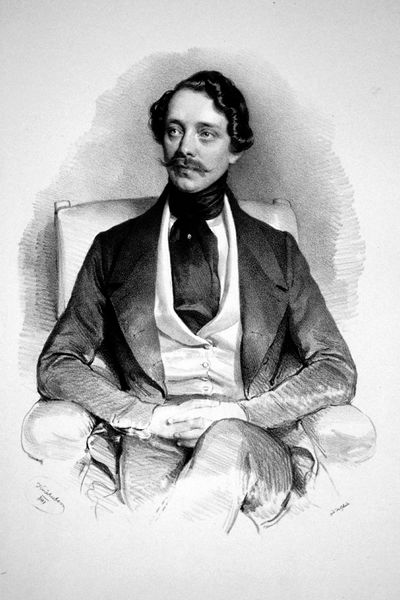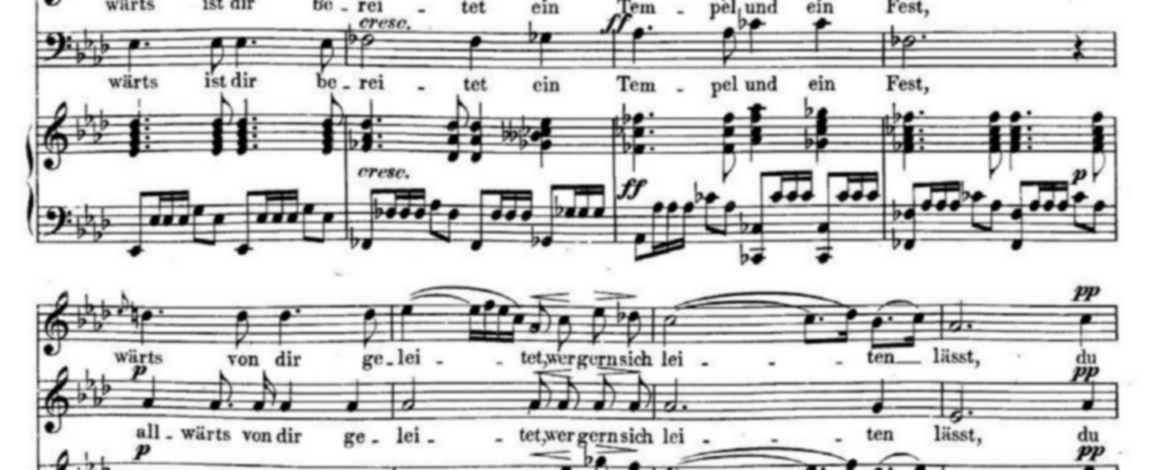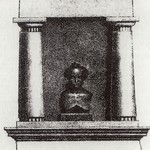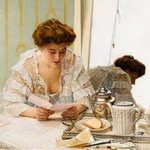
The regular readers probably remember that every year on these dates, coinciding with the anniversary of Franz Schubert's death, I dedicate the article to the apple of my eye, usually explaining some aspect of his life. Eight years ago, I talked about his circle of friends and, although I dedicated two weeks to it, many names were left out. Among them, Baron von Schönstein.
Karl von Schönstein was born in 1796, a year before Schubert. At his thirty-one he held a prestigious position in the administration of the Austrian Empire, that of hofkonzipist; his modern equivalent would be a project manager. When he first met Schubert in 1818, he was still konzeptspraktikant, i.e. he assisted a hofkonzipist to execute the projects. They met in Zselig, at the home of Count Johann Karl Esterházy (or János Károly Esterházy de Galántha, according to his Hungarian name); the Baron was visiting and Schubert was the teacher of daughters Marie and Karoline, aged sixteen and seven, respectively. Schönstein explains that he had been hired as répétiteur, rather than as a piano teacher; once Schubert was there they realized he was really talented.
The Baron was a good singer (he was a hoch baritone, in his words; I imagine his tessitura was similar to that of a baritenor), and until then, he used to sing Italian pieces, more or less like everyone else. However, he experienced a kind of revelation when he listened to Schubert's Lieder and from there on, he dedicated enthusiastically to German music. He became one of the “official” singers of Schubert's Lieder (the other being Johann Michael Vogl), and they were friends, literally, until the composer died: the last time that Schubert was out, ten days before his death, was to attend a dinner at the Baron's residence, Schönstein told later that his friend was lively and cheerful and nothing suggested that last illness that would lead him to death.
Baron von Schönstein, whom Schubert had dedicated nothing less than Die schöne Müllerin, always spread his music; his position in high Viennese society made him very effective. He was one of the people who discovered Schubert to Franz Liszt, who would soon become one of his champions in Paris. In 1838, Liszt wrote in the “Gazette Musicale”: “In the salons here I have often heard Schubert's songs given by the Baron Schönstein, always with the liveliest pleasure, and often with an emotion which moved me to tears. [...] The Baron gives them with the declamatory science of a great artist, and the simple feeling of an amateur who thinks only of his own emotions and forgets the public.”
Schönstein's texts on Schubert are not particularly extensive. One of the things he explains is the origin of the song we're listening to today, Gebet.
Tots dos amics van tornar a coincidir a Zselig el 1824; aquesta vegada, tots dos com a convidats de la família. En el cas de Schubert, no ben bé, perquè hi cobrava un sol, però, alhora, compartia els àpats i la societat amb la família i els convidats, mentre que durant la seva primera visita, a banda de cobrar bastant menys, feia vida amb el servei.
One day in September, during breakfast, Countess Róza asked Schubert to put music to a poem by Friedrich de la Motte Fouqué that she liked very much; it had to be a song for four voices because it was common for the Count, bass; the Countess, mezzo; Maria, soprano and the Baron, tenor, to sing with Caroline to accompany them to the piano; Schönstein explains that they used to perform works such as Die Schöpfung or Die Jahreszeiten by Haydn or the Requiem by Mozart. The poem spoke of God's goodness and power, and of how believers would give life for him if necessary. It was not a poem that he would have chosen, we know that he preferred spiritual poems of a more contemplative nature, but as you can imagine, he had no choice.
So Schubert retired and reappeared at dinner with the score; everyone was astonished, especially because he came back with an elaborate work. In the first stanza they sing all four practically at once; in the second, the verses are distributed to the soprano (it seems that Marie was the best singer in the group) and the mezzo, and in the third, to the bass (with a martial air for the count) and the tenor. The fourth stanza shares the musical material, approximately, with the first, while in the fifth stanza the tenor plays a leading role, and the rest of the voices are his chorus. Schubert could have ended here the song, but he reintroduces again the first stanza, now with new and more elaborate music, and then the fifth, this time led by the soprano. Fourteen sheets of score.
The Baron explains that they had a great time that evening with the song. I imagine all four of them around Schubert on the piano (it seems that he wanted to save Karoline the awkward position of playing that brand-new music), with just one score , making mistakes, laughing and repeating until achieving a nice interpretation. Always according to the Baron, the next day each had their copy of the score and they had even a better time. Schubert left Zselig leaving the song to the hosts, of course. A few years later, Countess Róza gave it to the Baron, who published it in 1838 with her consent.
Sunday will mark 195 years since the death of Franz Schubert. On Liederabend, as always, we remember the date by infinitely thanking him for the music. For our version of Gebet, D. 815, we have a first-class quintet: Ely Ameling, Janet Baker, Peter Schreier, Dietrich Fischer-Dieskau and Gerald Moore. I'm aware that the song is much longer than usual, but I think it's worth enjoying it to the end.
Du Urquell aller Güte,
Du Urquell aller Macht,
Lindhauchend aus der Blüte,
Hoch donnernd aus der Schlacht,
Allwärts ist dir bereitet
Ein Tempel und ein Fest,
Allwärts von dir geleitet,
Wer gern sich leiten lässt.
Du siehst in dies mein Herze,
Kennst seine Lust und Not,
Mild winkt der Heimat Kerze,
Kühn ruft glorwüd’ger Tod.
Mit mir in eins zusammen
Schlingt hier sich Kindes Huld,
Und draussen leuchten Flammen
Abbrennend Schmach und Schuld.
Bereit bin ich zu sterben
Im Kampf der Ahnen werth,
Nur sicher’ vor Verderben
Mir Weib und Kind am Heerd.
Dein ist in mir die Liebe,
Die diesen beiden quillt,
Dein auch sind mut’ge Triebe
Davon die Brust mir schwillt.
Kann es sich mild gestalten,
So lass es Herr gescheh’n,
Den Frieden fürder walten
Und Sitt’ und Ruh’ besteh’n.
Wo nicht, so gib zum Werke
Uns Licht in Sturmesnacht,
Du ew’ge Lieb’ und Stärke,
Dein Wollen sei vollbracht.
Wohin du mich willst haben,
Mein Herr! ich steh’ bereit.
Zu frommen Liebesgaben
Wie auch zum wackern Streit.
Dein Bot’ in Schlacht und Reise,
Dein Bot im stillen Haus,
Ruh’ ich auf alle Weise
Doch einst im Himmel aus.
Please follow this link if you need an English translation


















Comments powered by CComment